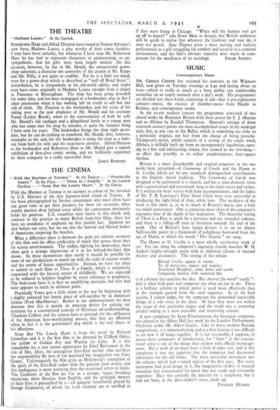Contemporary Music
MUSIC
MR. GERALD COOPER has resumed his concerts at the Wigmore Hall, now given on Tuesday evenings at 6.45 and lasting about an hour—which is really as much as a busy public can comfortably assimilate on an empty stomach after a day's work. His programmes are divided into three kinds, consisting of old—that is pre-eighteenth century—music, the classics of chamber-music from Haydn to Brahms, and contemporary works.
At the recent modern concert the programme consisted of two choral works by Benjamin Britten with three pieces by E. J. Moeran and an Alleluia by Randall Thompson. Moeran's settings of three sixteenth century poems are most accomplished essays in the madrigal style, but, at any rate in the Ballet, which is something too close to a particular original, not free from the charge of being pastiche. Thompson's motet, which consists of a setting of the single word, Alleluia, is skilfully built up from an incongruously lugubrious open- ing to a fine and exhilarating climax, but seemed to me over-long- an effect due possibly to its rather unadventurous, four-square rhythm.
Britten is a more Jansiderable and original composer in the two works here presented—A Ceremony of Carols and the Hymn to St. Cecilia, which are by any standards distinguished contributions to the English choral tradition. The Ceremony of Carols was designed to be performed in a church, and has a semi-dramatic form with a processional and recessional sung as the choir enters and retires. It is written for boys' voices with harp accompaniment, and the ladies of Mr. T. B. Lawrence's Fleet Street Choir were very successful in producing the right kind of clear, white tone. The weakness of the work is that there is, as in so much of Britten's music, just a little too much contrivance. One is conscious more often of the composer's ingenuity than of the depth of his inspiration. The beautiful setting of There is a Rose is spoilt by a perverse and too extended cadence, and there is a falling-off even in invention towards the end of the work. One of Britten's least happy devices is to set an almost Sullivan-like patter in a framework of polyphony borrowed from the age of Dufay, to which the words " Deo Gratias " are sung.
The Hymn to St. Cecilia is a more wholly satisfactory work of art. For one thing the composer's ingenuity exactly matches W. H. Auden's highly-wrought poem with its elaborate scheme of internal rhymes and assonances. The setting of the refrain Blessed Cecilia, appear in visions To all musicians, appear and inspire ; Translated Daughter, come down and startle Composing mortals with immortal fire is of a beauty that matches the idea. But observe the word" startle ": that is what both poet and composer too often set out to do. There is a brilliant scherzo in which patter is used more effectively than in the example quoted from the carol sequence. As to the final section, I cannot judge, for the composer has demanded impossible things of a solo voice in the choir. At least they were not within the scope of this particular singer, and the result was a somewhat painful ending to a most enjoyable and interesting concert.
A new symphony by Aram Khachaturian the Georgian composer, was played at the Albert Hall last week by the London Philharmonic Orchestra under Mr. Albert Coates. Like so many modern Russian compositions, it is immensely long and at a first hearing it was difficult- to see how it all hangs together. It is not reasonable, I suppose, to accuse these composers of formlessness, for " form " in the conven- tional sense is one of the things they eschew with official encourage- ment. But a work of art must have a form of some sort, and in this symphony it was not apparent that the composer had discovered substitutes for the old forms. The most successful movement was the scherzo, which had a varied reprise of the first part. But every movement had good things in it, fine imaginative strokes of musical invention that compensated for much that was crude and tiresomely repetitive. Here was certainly the material for a symphony, but it had not been, in the dress-maker's sense, made up.
DYNELEY HUSSEY.


























 Previous page
Previous page